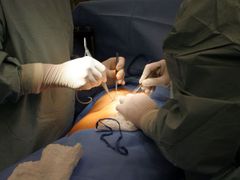Prague - Czechs are generally warm to the idea of giving and receiving body organs, but the numbers of those supporting organ tansplants are declining. It goes hand in hand with the increasing distrust towards the process complicated by the ethical issues surrounding the organ procurement.
These are the findings of the latest survey on the matter, for which Factum Invenio pollsters interviewed 987 people in the Czech Republic.
They found that 79 per cent of those asked supported transplantation while 17 per cent refused the idea. That is a big increase compared to six years ago, when only 8 per cent said they were against it.
Lack of information
"The results of the survey also show that the issue of organ transplants is disappearing from the public discussions, because people are less informed about the issue," said Factum Invenio director Jan Herzmann.
The Czech Transplant Society is now trying to remedy the situation by having set up the information webpage www.transplantace.eu and working on further publicity projects.
The survey also reflects that people are increasingly worried about doctors treating the body of the deceased with not enough respect. That is further aggravated by fears of contributing to the illicit human organs trade, something that one in three Czechs apparently deem possible.
"On the other hand, what we see as a positive trend is the growing number of people who consider organ transplants a regular treatment. Several years ago it was still perceived as more of an experiment," says Štefan Víko, head of the transplant centre at the Institute for Clinical and Experimental Medicine (IKEM).
Give or take
Donating one's organs is acceptable to 59 per cent of the Czechs while 26 per cent are against it. The rest is not sure about where they stand on the issue. Four fifths of those asked said they would have no problem with receiving a body organ from a donor.
"This is interesting. People would rather accept an organ from somebody else than give their own," noted Mr Herzmann.
When compared to other Europeans, the views of Czech people on the transplantation are generally positive.
Most accepting in this respect are Swedes and Danes but it does not show in the number of the actual transplant operations: Scandinavian doctors have less work than their colleagues in the Czech Republic.
The Czech Republic uses a system of the so-called "presumed agreement" which allows for extraction of a body organ from every suitable donor without his or her previous consent. If somebody does not want to donate organs, they can register at any time in a database which is checked by doctors before every organ extraction.
While most European countries use a system of donor cards, the system of the presumed agreement has a growing support among the Czech population. Factum Invenio found almost half of those asked being for it with most supporters being university-educated.
Shortage of donors
Shortage of donors is a global problem. People in need of an organ greatly exceed the number of kidneys or livers available and they have to wait months or even years until the get one, if ever.
Mr Vítko believes the number of procured organs could by higher if the laws were amended. At the moment doctors have no financial incentives to do transplants. Nevertheless, the number of donors in the Czech Republic is still above European average with the number of transplant operations done here being twofold of that in Greece or Australia. Peerless in this respect are doctors in Spain.
"They have a system in Spain of organ procurement coordinators who continually assess the condition of comatose patients. There is no such thing in other European countries because of the ethical reasons," explained Mr Vítko.
As he said it would be impossible to replicate this system in the Czech Republic both for the ethical and the financial reasons as the work of the coordinators in Spain is generously subsidized by the government in Madrid.









